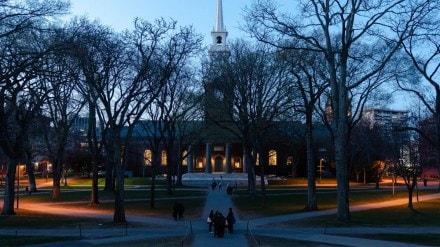Harvard is engaged in a two-pronged conflict with the Trump administration. One relates to the budget freeze, and the other to the authorization to host overseas students.
Harvard’s case over the revocation of its enrollment status for international students is currently ongoing. On May 22, the US Department of Homeland Security revoked Harvard University’s certification to host overseas students and terminated its Student and Exchange Visitor Program (SEVP) certification.
Harvard was given 72 hours to comply with demands for student records, including disciplinary data and protest footage, to reinstate its SEVIS access.
On the same day, Harvard went to court and got a temporary restraining order (TRO). In its lawsuit, Harvard argued that the government’s actions violate the First Amendment, the Due Process Clause, and the Administrative Procedure Act.
On May 29, a federal judge upheld the block on the Trump administration’s attempt to end Harvard’s enrollment of international students.
On the night of May 28, the Trump administration’s lawyers filed a withdrawal notice, delivering it to the Harvard International Office at 11:50 p.m., according to Harvard lawyer Ian H. Gershengorn, reported The Harvard Crimson.
The letter — a formal notice that the DHS intends to withdraw Harvard’s eligibility — initiates a longer process, giving Harvard the customary 30-day response time to demonstrate compliance with the law.
The next deadline for Harvard could therefore be June 28 unless court orders land up before that date.
The DHS may revoke Harvard’s SEVP certification after 30 days if it continues to accuse Harvard of violating the law unless a preliminary injunction is granted.
White House spokesperson Abigail T. Jackson stated in a statement that the administration was certain its actions were legal and that the courts had no authority over the executive branch’s decision to assign SEVP status.
Trump administration has attempted to end Harvard’s entitlement to enroll international students. The US Department of Homeland Security’s decision to revoke SEVP certification directly threatened the future of nearly 5,00 international students at Harvard, including nearly 800 from India.
Last week on Thursday, a federal judge extended a temporary restraining order blocking the Trump administration from terminating Harvard’s right to host international students and scholars. The TRO will stay in place until a broader injunction is agreed upon.
Harvard will continue to enroll international students until the next scheduled hearing date.
On the funding freeze, the Trump administration on April 21 halted an initial research funding freeze of $2.2 billion, just hours after Harvard publicly rejected a set of comprehensive requests to alter its employment and admissions procedures, tighten down on protests, and remove diversity initiatives. It was followed up with cutting another $450 million.
Harvard has asked a federal judge to provide a summary judgment in a lawsuit against the Trump administration’s freeze on federal research funding, reports The Harvard Crimson. Harvard has requested a summary judgment before September 3, the federal government’s deadline to liquidate financial obligations under the first round of canceled grants. Harvard’s lawyers argued that the federal government may not be able to restore the frozen funding after the deadline.
Harvard’s effort to protect its funding is running concurrently with a second ongoing case the university launched against the Trump administration to keep its authority to accept overseas students.
In the last court hearing, Trump administration lawyers indicated that the government may back down from plans to immediately revoke Harvard’s ability to enroll international students and instead pursue a longer process. Trump, meanwhile, is taking Harvard on all fronts but has said that the university’s ability to host foreign students could be capped at 15%. Harvard appears to have a long and winding route ahead of it, filled with legal complications.
